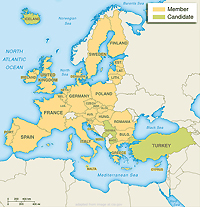EU opposes Russian oil and gas sanctions, considers targeting other sectors

(Business New Europe – bne.eu – Concorde Capital – July 24, 2014) EU Energy Commissioner GYnther Oettinger opposes sanctions on Russian natural gas and oil but doesn’t rule out sanctions on energy technology and equipment, he told a July 23 press conference in Brussels, as reported by the UNIAN news agency. “I always spoke against including energy supplies of Russian oil and gas in sanctions lists,” he said. “But if they don’t try to live in peace with Ukraine and won’t avoid escalations, then we won’t have the grounds to assist with equipping, for example with drills, and energy technologies that their industries can’t produce.
The European Commission will continue to make efforts in the coming weeks to de-escalate the conflict and reach a new gas agreement between Russia and Ukraine, Oettinger said. The European Commission is also still considering filing a lawsuit against Gazprom, he said. “European gas is not a political instrument,” he said. “Experts discuss a situation, evaluate contracts and afterwards prepare proposals for us, which we discuss and on that basis we reach a decision,” he said.
The EU leadership has developed three scenarios of applying “sectoral sanctions” against Russia, ranging from simple restrictions without a significant economic effect to severe restrictions, capable of decimating the Russian budget, reported on July 24 euobserver.com. The least intensive measures impose restrictions on several categories of imports from Russia, the report said, including luxury items, fertilizers, chemicals, ships and armaments. This “weak scenario” offers only a declarative ban on military cooperation between the EU and Russia, the report said. Intermediary sanctions would forbid imports and exports of sensitive military technologies and sensitive economic sectors. The most severe scenario implies North-Korea- or Iran-style isolation, the likelihood of which is “close to nil,” the report said.
Zenon Zawada: Sanctions have been an effective deterrent of Russian military aggression so far and further measures will serve that purpose well. Yet sanctions can’t resolve the conflict between Russia and Ukraine, which will ultimately end in a military victory of one side or the other (we don’t see a compromise on the horizon). That could take months or years. Meanwhile, the EU would be well-advised to diversify its energy sources, including American natural gas.
